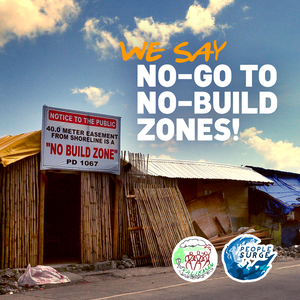To: DENR Secretary Ramon Paje and President Noynoy Aquino
'No Go' to the 'No-Build Zones' Policy!

We challenge Department of Environment and Natural Resources Secretary Ramon Paje, President Noynoy Aquino, and other responsible PH government officials to officially declare the junking of the ‘No-Build Zone’, from a public declaration retracting the policy down to the dismantling of the NBZ signages and fencings on the ground.
We challenge the Aquino administration to focus on improving the capacities of communities to manage their coastal resources, ecosystems and risk management systems themselves for the sake of their protection and their livelihood as well—instead of promoting development aggression.
We challenge them to provide, where appropriate, temporary shelters, evacuation centers, and housing that are universally accessible and climate-resilient to Haiyan victims and all coastal communities—instead of arbitrary demolition.
We unite with the Typhoon Haiyan victims as we say: ‘No Go’ to No-Build Zones!
We challenge the Aquino administration to focus on improving the capacities of communities to manage their coastal resources, ecosystems and risk management systems themselves for the sake of their protection and their livelihood as well—instead of promoting development aggression.
We challenge them to provide, where appropriate, temporary shelters, evacuation centers, and housing that are universally accessible and climate-resilient to Haiyan victims and all coastal communities—instead of arbitrary demolition.
We unite with the Typhoon Haiyan victims as we say: ‘No Go’ to No-Build Zones!
Why is this important?
Around 10.8 million people in coastal communities across the Philippines continue to be threatened by the ‘No-Build Zone’ (NBZ) policy, declared by the national government under President Noynoy Aquino to arbitrarily ban dwellings within a 40-meter prohibited zone.
The NBZ is an imposition that has no sufficient scientific and legal basis, and provides no feasible relocation or livelihood alternatives to the displaced communities. Communities in NBZs have been threatened with demolition, and even excluded from government relief and rehabilitation efforts.
We note the selective nature of the NBZ, later reformulated as ‘No-Dwelling Zones’ to exempt private corporations currently in a mad race to convert thousands of hectares of Haiyan-affected coastal areas into special economic zones, extractive industries, and so-called eco-tourism projects. This profit-driven mode of coastal development has led to the rapid degradation of our coastal and marine ecosystems and resources in the first place.
We believe reducing disaster risks in coastal areas cannot be achieved by simply removing communities away from their source of livelihood, and promoting the entry of coastal ‘development aggression’ projects. Building resilience in the face of the climate crisis does not mean pushing front-line communities towards greater vulnerability.
The NBZ is an imposition that has no sufficient scientific and legal basis, and provides no feasible relocation or livelihood alternatives to the displaced communities. Communities in NBZs have been threatened with demolition, and even excluded from government relief and rehabilitation efforts.
We note the selective nature of the NBZ, later reformulated as ‘No-Dwelling Zones’ to exempt private corporations currently in a mad race to convert thousands of hectares of Haiyan-affected coastal areas into special economic zones, extractive industries, and so-called eco-tourism projects. This profit-driven mode of coastal development has led to the rapid degradation of our coastal and marine ecosystems and resources in the first place.
We believe reducing disaster risks in coastal areas cannot be achieved by simply removing communities away from their source of livelihood, and promoting the entry of coastal ‘development aggression’ projects. Building resilience in the face of the climate crisis does not mean pushing front-line communities towards greater vulnerability.